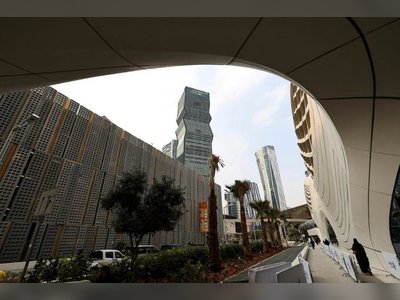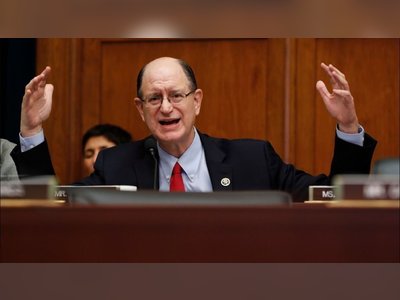0:00
0:00
Saudi Council of Ministers Rejects Israeli Statements on Palestinian Displacement
Cabinet discusses regional developments and reaffirms commitment to Palestinian cause amid international cooperation initiatives.
The Saudi Council of Ministers, led by Crown Prince and Prime Minister Mohammed bin Salman, reiterated its firm rejection of statements from Israel regarding the displacement of Palestinians during a Cabinet session on Tuesday.
Saudi Minister of Media, Salman Al-Dossary, conveyed the Cabinet's stance in a statement to the Saudi Press Agency following the meeting.
The session involved discussions on recent regional and international developments, with a strong emphasis on the centrality of the Palestinian cause to Saudi Arabia.
The Cabinet reinforced that lasting peace is contingent upon the acceptance of peaceful coexistence through a two-state solution.
Crown Prince Mohammed bin Salman briefed the Cabinet on his recent communications with King Abdullah II of Jordan and UAE President Sheikh Mohamed bin Zayed Al Nahyan.
Additionally, the Cabinet reviewed updates regarding the progress of various joint committees established between Saudi Arabia and other nations, underscoring initiatives aimed at enhancing cooperation, friendship, and mutual benefits across diverse sectors.
Saudi Arabia's prominent role in multilateral organizations was highlighted, particularly its recent election to the Executive Committee of the International Association of Anti-Corruption Authorities (IAACA), which reflects the international community's recognition of the Kingdom's initiatives and global standing regarding anti-corruption affairs.
On the domestic front, the Cabinet focused on the Kingdom’s developmental initiatives targeted at empowering emerging sectors.
The session welcomed the launch of the King Salman Automotive Cluster, slated to bolster economic diversification efforts, enhance non-oil GDP, and support the objectives of the National Industrial Development and Logistics Program.
Minister Al-Dossary noted the Cabinet's appreciation for the successful completion of the Fiscal Sustainability Program's executive plan, which aims to improve spending efficiency, augment revenues, and reinforce planning capabilities in light of Saudi Vision 2030. This program is pivotal in preparing public finances for structural transitions and economic reforms, bolstering the Kingdom's financial stability.
Further deliberations revealed Saudi Arabia's leading position among G20 countries in the Security Index, an indicator of its commitment to security, prosperity, and stability.
The Cabinet evaluated the findings from various councils, including the Political and Security Affairs Council and the Economic and Development Affairs Council, and approved several legislative amendments and cooperation agreements.
Noteworthy approvals included amendments to the Public Prosecution and Board of Grievances laws, aimed at enhancing the expertise involved in the formation of crucial councils.
The Cabinet also endorsed a range of bilateral agreements with various countries, including arrangements for combating drug trafficking with Jordan, visa exemption agreements with the Solomon Islands, and partnerships in economic planning with Oman.
Additionally, the Cabinet authorized negotiations for a memorandum of understanding (MoU) on political consultations with Armenia and approved MoUs regarding maritime transport with Egypt and meteorological cooperation with the UK, as well as a central banking cooperation agreement with Türkiye.
Saudi Minister of Media, Salman Al-Dossary, conveyed the Cabinet's stance in a statement to the Saudi Press Agency following the meeting.
The session involved discussions on recent regional and international developments, with a strong emphasis on the centrality of the Palestinian cause to Saudi Arabia.
The Cabinet reinforced that lasting peace is contingent upon the acceptance of peaceful coexistence through a two-state solution.
Crown Prince Mohammed bin Salman briefed the Cabinet on his recent communications with King Abdullah II of Jordan and UAE President Sheikh Mohamed bin Zayed Al Nahyan.
Additionally, the Cabinet reviewed updates regarding the progress of various joint committees established between Saudi Arabia and other nations, underscoring initiatives aimed at enhancing cooperation, friendship, and mutual benefits across diverse sectors.
Saudi Arabia's prominent role in multilateral organizations was highlighted, particularly its recent election to the Executive Committee of the International Association of Anti-Corruption Authorities (IAACA), which reflects the international community's recognition of the Kingdom's initiatives and global standing regarding anti-corruption affairs.
On the domestic front, the Cabinet focused on the Kingdom’s developmental initiatives targeted at empowering emerging sectors.
The session welcomed the launch of the King Salman Automotive Cluster, slated to bolster economic diversification efforts, enhance non-oil GDP, and support the objectives of the National Industrial Development and Logistics Program.
Minister Al-Dossary noted the Cabinet's appreciation for the successful completion of the Fiscal Sustainability Program's executive plan, which aims to improve spending efficiency, augment revenues, and reinforce planning capabilities in light of Saudi Vision 2030. This program is pivotal in preparing public finances for structural transitions and economic reforms, bolstering the Kingdom's financial stability.
Further deliberations revealed Saudi Arabia's leading position among G20 countries in the Security Index, an indicator of its commitment to security, prosperity, and stability.
The Cabinet evaluated the findings from various councils, including the Political and Security Affairs Council and the Economic and Development Affairs Council, and approved several legislative amendments and cooperation agreements.
Noteworthy approvals included amendments to the Public Prosecution and Board of Grievances laws, aimed at enhancing the expertise involved in the formation of crucial councils.
The Cabinet also endorsed a range of bilateral agreements with various countries, including arrangements for combating drug trafficking with Jordan, visa exemption agreements with the Solomon Islands, and partnerships in economic planning with Oman.
Additionally, the Cabinet authorized negotiations for a memorandum of understanding (MoU) on political consultations with Armenia and approved MoUs regarding maritime transport with Egypt and meteorological cooperation with the UK, as well as a central banking cooperation agreement with Türkiye.











